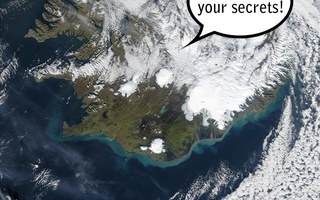Professor Charles S. Smith, of Columbia College delivered a very interesting lecture before the Deutscher Verein last evening on "Iceland in History and Literature."
Iceland, he said, was first discovered in 865 by some venturesome Germans who were making trials of the seas. These people did not settle here but returned home as did many other explorers quite disheartened at the country. A permanent settlement, however, was made by Ingolfe in 874. The manner of the settlement was this: The people in the inlands south of Norway being unwilling to submit to Norwegian rule, migrated to Iceland in 884. This people increased until the population became from 25,000 to 30,000. They settled at first about the temples in little bands but finally agreed to unite and form a democracy. A constitution was adopted from Norway; the state was divided into four parts, and the latter into thirty nine parishes equally distributed over the island. Its population consists of three classes, the priest chieftain, common free man, who kept slaves, and the peasant. Its religion was native until Christianity was introduced in 1000.
The early literature of Iceland was written in old Norse prose and poetry, the latter being subdivided into the poetry of the Edda and Skald or court poetry. The Icelandic poet was not a poet in the strict sense of the word, but a story teller who wandered about reciting tales of Scandinavian origin. The Saga, the heroic tradition of the Norsemen, is divided in three periods: the heroic period up to 1030; the period of development from 1030 to 1100, and a third period from 1100 to 1200, during which all these legends were written down. In speaking of the Nibelungenlied, Professor Smith said there is no comparison between the Icelandic version and its present form, since the Icelandic is more powerful, grander, and more pleasing.
Professor Smith closed his lecture with selections from the Nibelungenlied, the Skald and the Edda, first repeating in the original and then translating. After the lecture a number of stereopticon views were shown.
Read more in News
Harvard Fencers Win.Recommended Articles
-
Icelandic ImpasseIceland's current internal disorders create a situation which distorts the significance of that small island nation far out of proportion
-
NORDAL LAUDS ICELAND IN FIRST NORTON TALKSpeaking to a large audience yesterday afternoon in the Fogg Art Museum Professor Sigurthur Nordal outlined the history and unique
-
Gone With the (Arctic) WindIt was beautiful while it lasted: Impressive growth rates, speedy development, and a strong and diversified financial services industry put
-
 Iceland: the New Hub for Journalism?
Iceland: the New Hub for Journalism? -
Icelandic Invasion Sweeps BostonThe Roving Reporter survey's Boston's 3rd annual A Taste of Iceland festival.













